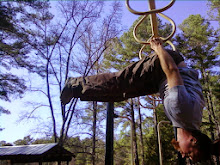
The Coach - Dan John - Lifiting and Throwing
"The body is one piece."
It amazes me that some exercise physiologists STILL are thinking inside the "can" (that's what I call the world of academia.) I recently had an argument with a young graduate of an ex phys school who still did not want to believe that an overhead squat, or a Olympic deadlift could help create greater gains in strength for cyclists. In his words, "I don't think that these lifts translate well to riding a bike."
Ok, why not? This is my question. If a cyclist has to have "core" strength from which to pedal, why not utilize a lift that not only works on the "core," but solid leg strength as well? One can do a sit up, a plank, a crunch, a twisty thingy with your legs in the air...but I say, how do THESE translate well to the bike?
So, where do you get the power from which to push, or pull? If the body is one piece, utilize it as such in your training, and there's nothing better than an O-lift or two to cement your "core" training.
I read an incredible analogy from Rannoch Donald that goes like this:
"the idea of firing a cannon from a canoe on water or from a solid base. In the canoe there is no foundation, no base. ...no power. With a firm foundation there is something to react against, to push from. It is basic mechanics."
.jpg)










